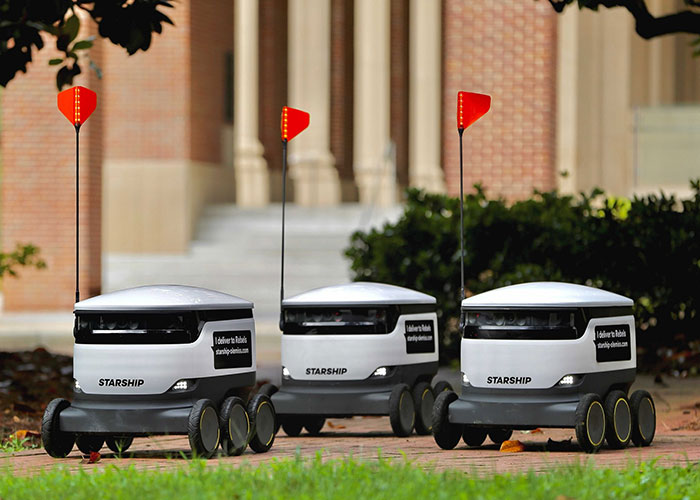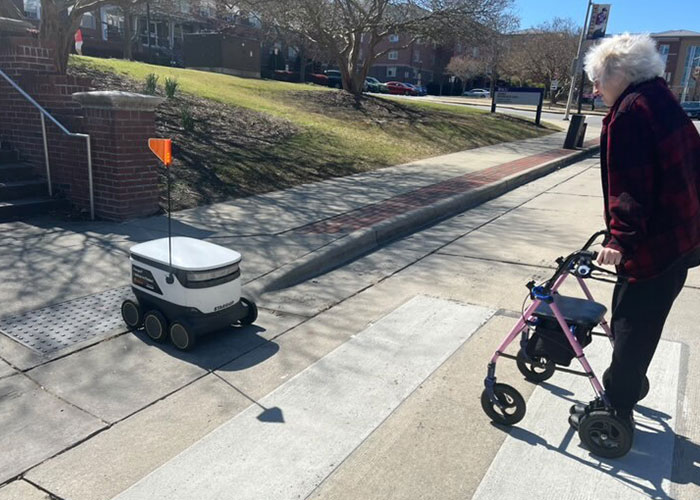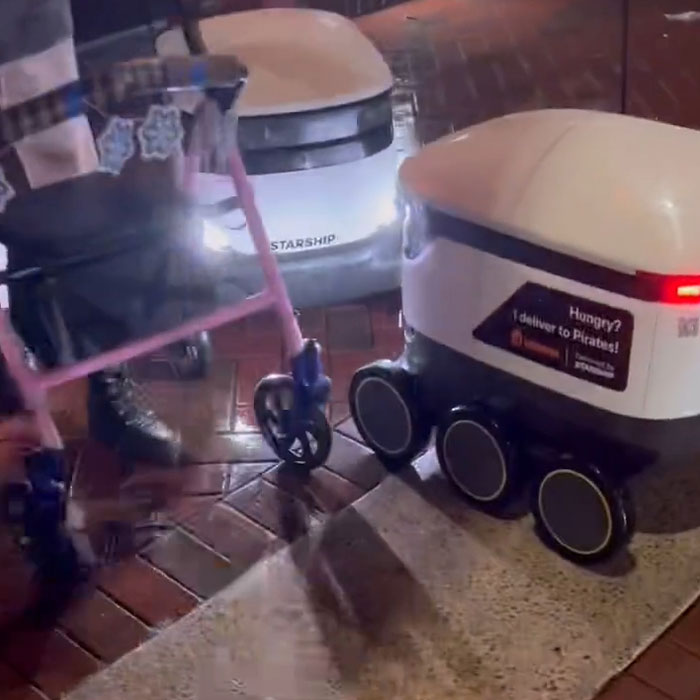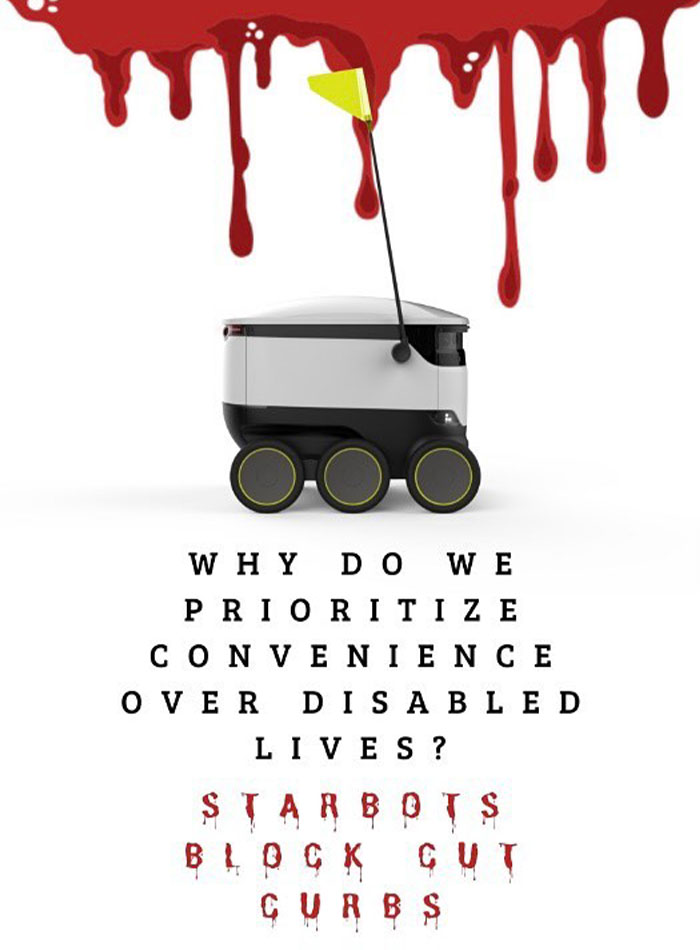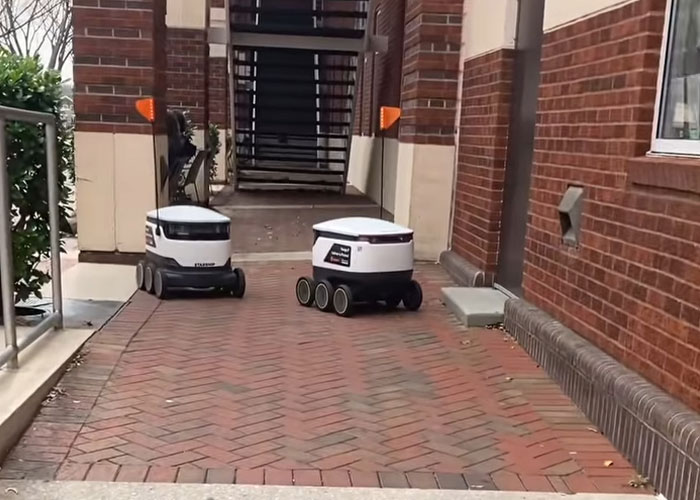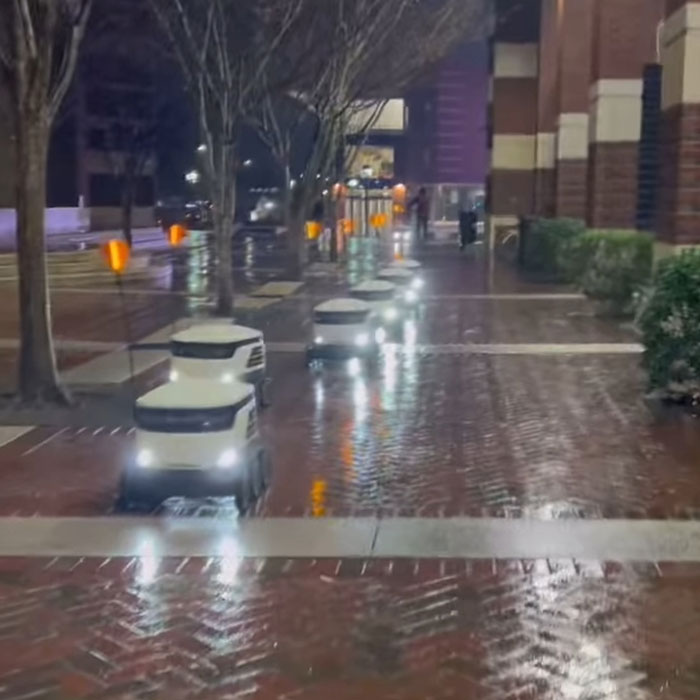In January 2023, East Carolina University (ECU) introduced Starship delivery robots to “offer innovative service to the campus community,” as per the institution’s press release published last year. But to 19-year-old Sierra Isaacs, a freshman at the college, the small, six-wheeled vehicles aimed at facilitating certain services have become nothing but a nuisance. “I’ve been hit a total of three times since I moved on campus in August 2023,” Sierra, who uses a walker to get around as a result of an undisclosed disability, told Bored Panda. In fact, Starship delivery robots pose a safety risk to other disabled people, a student-led campaign stated through a petition against the autonomous machines. “The robot delivery system is not only expensive and ineffective but dangerous to students,” the petition, created by Aiden Swiatkowski, read.
A campaign was launched to remove Starship delivery robots from East Carolina University due to safety concerns
Share icon Image credits: Starship Technologies It further claimed: “The delivery robots block cut curbs, cramp walkways, ram into students, and take away jobs from students and citizens. “Starship Technologies and the universities they work with, including East Carolina University, have been made aware of these concerns multiple times and have continuously failed to alleviate these issues. “At this point, the only way to ensure the safety and independence of Pirates of all abilities is to get this product off our campus.” Sierra, who studies interpersonal communications, is the communication chair for the Disability Advocacy and Support Club at ECU. She recalled that the first time she had been hit by one of the Starship robots, it was “just a headbutt into my walker as the robot was dodging another student.”
19-year-old Sierra Isaacs, a freshman at the college who uses a walker, claims she was hit three times by the robots
Share icon Image credits: Sierra Isaacs She added: “The second hit was a robot clipping my back wheel while I was going down a ramp in the dark. “The third and most significant hit was [at] the crosswalk, which left my walker damaged and my leg bruised.” The student claimed that the robots constantly block the curb cuts, leaving those who rely on wheels for mobility trapped in the road. “Every safety concern has been reported to both East Carolina University and Starship Technologies in a timely manner,” she said. Bored Panda has contacted Starship and ECU for comment.
The student-led campaign against the robots created an Instagram page to share videos of the machines often taking up sidewalk space
Share icon Image credits: pirates_vs_starbots According to Sierra, upon her walker being allegedly broken by one of the smart engines, Starship Technologies offered a $100 settlement agreement, which would require her to stop raising awareness about the safety concerns. Bored Panda has since reviewed documents sent by Sierra that confirm her claims. “The robots have made it more difficult for everybody to get around,” Sierra said. She continued: “I’ve had my able-bodied friends complain to me about the robots stopping mere inches from their feet and tripping them up. “Students on skateboards and bikes have also been having issues with getting hit. “For me, these robots double my pedestrian commute time or make it impossible.”
“The only way to ensure the safety and independence of Pirates of all abilities is to get this product off our campus,” a petition stated
Share icon Image credits: pirates_vs_starbots “I use a walker, which takes up about the same amount of space as a wheelchair. “When a robot is in the middle of the sidewalk, ramp, or cut curb, I simply cannot pass it. “This results in me being stuck until someone is able to help me.” The student-led campaign against the robots has created an Instagram page to share videos of the machines often taking up sidewalk space. Sometimes, the robots appear in groups and completely bar bypassers’ way. Sierra acknowledged that communication with ECU and Starship Technologies had been easy but unproductive. She also noted that her discontent wasn’t shared by all on campus. “Many students love the robots and order delivery regularly,” she said.
“These robots double my pedestrian commute time or make it impossible,” Sierra said
Share icon Image credits: pirates_vs_starbots Sierra continued: “They see them as cute and novel, partially because of Starship’s marketing making pointed efforts to humanize their product. “I’ve had many students respond defensively to me shedding light on the issues, posting things by my dorm room’s door, like ‘robot lives matter,’ and yelling ‘handicap b***h’ at my door in the middle of the night.” The exasperated student has even lost friends since creating the campaign’s Instagram account. “It’s really heartbreaking to see my peers prioritize these robots over my safety. It makes me feel unwelcome on campus,” she said. Starship Technologies, an Estonian company, has been offering autonomous robots since January 2019, with George Mason University in Virginia becoming the first academic institution in the US to implement the delivery service. It wasn’t long before trouble started, as in October 2019, a University of Pittsburgh student flagged issues with the robots blocking access to sidewalks. Emily Ackerman, a fifth-year Ph.D. student working with the University of Pittsburgh’s Shoemaker Immunosystems Lab, described her experience with the Starship robots in a series of posts on X (formerly known as Twitter).
Starship Technologies, an Estonian company, has been offering autonomous robots since January 2019
Share icon Image credits: pirates_vs_starbots Emily, who uses a wheelchair and relies on curb cuts to access the sidewalk when she crosses the street, claimed one of the Starship robots idled in a curb cut, blocking her entrance from the street to the sidewalk, as per Trib Live. “It’s terrifying because there is nothing I can do at the moment,” Emily wrote at the time, explaining that she could be trapped in the street and in the path of cars if the robots didn’t move out of the way fast enough. The number of complaints against the bots has been difficult to track due to the lack of available data to measure the issue. Nevertheless, Starship Technologies, which is the start-up led by one of the early developers of Skype, has shown no sign of stopping, as it recently raised $90 million in a new funding round, Forbes reported last month. According to the company, its robots are active in 80 locations, including in the US, UK, Germany, Denmark, Estonia, and Finland, and they have carried out more than six million deliveries since it was founded 10 years ago. Anyone can write on Bored Panda. Start writing! Follow Bored Panda on Google News! Follow us on Flipboard.com/@boredpanda!
